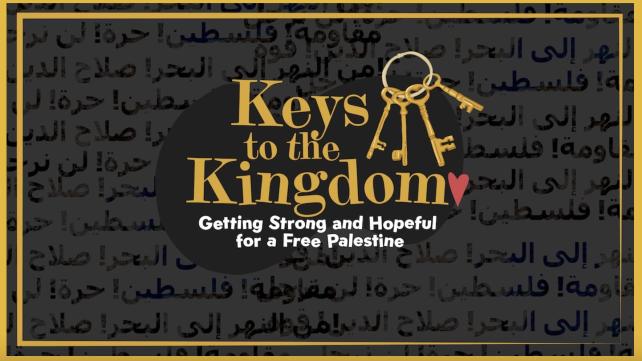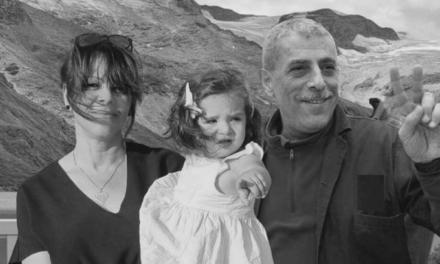“Aunty Hiba” Masood is no stranger to Sound Vision’s children’s programming. Her knowledge, creativity, and insatiable enthusiasm for Islamic education have propelled her to consistently deliver top-notch online classes in our Colors of Islam Club and, more recently, under the banner of dearMuslimkids.com. She has been vocal in sharing her feelings about the recent escalation of genocide against the Palestinian people, feelings shared by many parents across the globe. But in the way that Aunty Hiba does best, she has transformed her “grage” – the combination of grief and rage – into action and developed an online program to help Muslim children understand the chaos of today’s world and, more importantly, trust that Allah is The All-Knowing and All-Wise.
Keys to the Kingdom is a four-part series designed to give Muslim children answers to their questions about the atrocities in Palestine. It provides a way to understand several conflicting feelings about what they are seeing and hearing, a reference to pertinent Islamic history from the region, and also advice on what our children can do to make a difference. The video series is best suited for children who are ages 10+ and will provide a lot of context for future discussion.
Here is a summary of the four different videos that are included in the package.
E1: Kids Talk Palestine (26:36)
In the first video, Aunty Hiba is in a Zoom meeting with 18 kids and answers more than 30 separate questions such as:
- Both Israel and Palestine occupy the same land, whose land is it anyway?
- If things are so bad, why don’t the Palestinians just leave?
- How come the world is not recognizing how bad and racist the situation is?
- If even governments and news organizations don’t tell the truth, who are we supposed to trust?
- Do Muslims hate Jews?
- What should we be doing? What does Allah want us to do?
These are simple questions but most don’t have simple answers. Hiba does a great job explaining the situation with facts and Islamic guidance. There are also several important words defined such as oppression, genocide, propaganda, apartheid, gas lighting, anti-Semitic, and more.
Be forewarned: parents may have to explain some of the details, too.
E2: Jester Feels for Falasteen (22:27)
The second video features two central characters who will be familiar to dearMuslimkids fans – Jester and Prof – who are in Shukarland and preparing to participate in a rally for Palestine. In this segment, Jester reports feeling overwhelmed with sadness, anger, and hopelessness. These are common feelings for adults and children.
The Professor (a.k.a Prof) admits to having the same feelings but makes an effort to channel his energy into taking action. He advises that “how we think about a challenge helps us deal with it.” There is much discussion about the importance of Palestine as the third holiest city in Islam, as the birthplace of the prophets, about Masjid al-Aqsa, about Jerusalem being the first qibla, and more.
There is mention that anger can drive us to action and of a reminder that our rich Islamic history holds many examples where believers were persecuted by tyrants for some time and how those oppressors were also punished by Allah with even the smallest and simplest of things. For instance, Nimrod was ended with a mosquito, Firaun with water, and the evil Abraha with tiny pebbles carried by birds.
The video references a number of Quranic ayaat and hadiths which talk about why our hearts are feeling the pain of our brothers and sisters and the importance of unity. Aunty Hiba brings inspiration about how we can all take responsibility and strengthen the ummah by:
- spreading awareness
- speaking out and attending rallies
- boycotting companies that are supporting oppression and injustice
- educating ourselves about the past and the present
- making duaa
Prof reminds us that we are in charge of our efforts but Allah is in charge of the result and the reward. He then makes a beautiful duaa and encourages viewers to do the same.
E3: Salahuddin’s Conquest of Jerusalem (10:46)
The third video is a comprehensive history lesson about Salahuddin, may Allah be pleased with him, and the city of Jerusalem. His life story is covered from a young age, focusing attention on his zeal for learning about Islam and mastery of archery, swordsmanship, and horseback riding. There are details of the battles that were lost and how victory prevailed in the end.
Six take-away lessons are enumerated and relevant to our struggles today.
- Live life as a good righteous Muslim and Allah will provide the reward.
- Honor your word and you will be respected.
- Unity is strength and we are stronger together.
- Follow the example of the Prophet Muhammad, peace and blessings be upon him, especially in victory.
- Be strong physically, mentally, emotionally. Allah loves strength.
- Sow seeds of goodness, even if you don’t live to see the results.
E4: Beautiful Names of Allah (7:57)
The fourth and final video in the series is about raising our voices against injustice to the One Who matters most. Aunty Hiba reminds us that duaa is the best form of worship and references a narration that the Prophet Muhammad, peace and blessings be upon him, said:
“Nothing is more honorable to Allah than supplication.”
And a verse in the Quran that reiterates the importance of duaa.
“And when My slaves ask you [O Muhammad] concerning Me, indeed I am near. I respond to the invocation of the supplicant when he calls upon Me. So let them obey Me and believe in Me so that they may be on the right path.” (2:186)
Not only is the prescription to make duaa for our brothers and sisters in Palestine but to do so in the best possible way using Allah’s Most Beautiful Names. Five are highlighted and explained in detail:
- Al Musta’an, The One We Turn to for Help and Support
- Al-Muhaymin, The Preserver of Safety and The Overseeing Protector
- Al-Fattah, The Opener of Things that Are Closed
- Al Maalikul Mulk, The Master of the Kingdom, The Ownder of the Dominion
- Al Muntaqim, The Retaliator
Keys to the Kingdom is timely and available free of charge at dearMuslimkids.com. There are many other offerings available for free or as part of a membership subscription. All include the same poignant content, attention to detail, kid-friendly instruction, reliance on Islamic guidance, attractive graphics, and tender loving care for the future of our ummah – our children.














